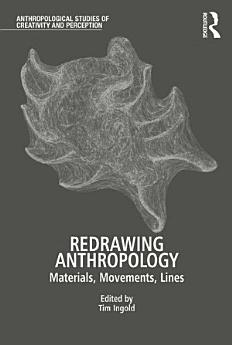Redrawing Anthropology: Materials, Movements, Lines
Tim Ingold
এপ্রি ২০১৬ · Routledge
ই-বুক
216
পৃষ্ঠা
family_home
উপযুক্ত
info
reportরেটিং ও রিভিউ যাচাই করা হয়নি আরও জানুন
এই ই-বুকের বিষয়ে
Why should anthropologists draw? The answer proposed in this groundbreaking volume is that drawing uniquely brings together ways of making, observing and describing. In twelve chapters, a team of authors from the UK, Europe, North America and Australia explore the potential of a graphic anthropology to change the way we think about creativity and perception, to grasp the dynamics of improvisatory practice, and to refocus the study of material culture from ready-made objects onto the flows of materials involved in the generation of things. Drawing on expertise in fields ranging from craftwork, martial arts, and dance to observational cinema and experimental film, they ask what it means to follow materials, to learn movements and to draw lines. Along the way, they contribute to key debates on what happens in making, the relation between design and performance, how people acquire bodily skills, the place of movement in human self-awareness, the relation between walking and imagination, and the perception of time. This book will appeal not just to social, cultural and visual anthropologists but to archaeologists and students of material culture, as well as to scholars across the arts, humanities and social sciences with interests in perception, creativity and material culture.
লেখক সম্পর্কে
Tim Ingold is Professor of Social Anthropology at the University of Aberdeen, UK
ই-বুকে রেটিং দিন
আপনার মতামত জানান।
পঠন তথ্য
স্মার্টফোন এবং ট্যাবলেট
Android এবং iPad/iPhone এর জন্য Google Play বই অ্যাপ ইনস্টল করুন। এটি আপনার অ্যাকাউন্টের সাথে অটোমেটিক সিঙ্ক হয় ও আপনি অনলাইন বা অফলাইন যাই থাকুন না কেন আপনাকে পড়তে দেয়।
ল্যাপটপ ও কম্পিউটার
Google Play থেকে কেনা অডিওবুক আপনি কম্পিউটারের ওয়েব ব্রাউজারে শুনতে পারেন।
eReader এবং অন্যান্য ডিভাইস
Kobo eReaders-এর মতো e-ink ডিভাইসে পড়তে, আপনাকে একটি ফাইল ডাউনলোড ও আপনার ডিভাইসে ট্রান্সফার করতে হবে। ব্যবহারকারীর উদ্দেশ্যে তৈরি সহায়তা কেন্দ্রতে দেওয়া নির্দেশাবলী অনুসরণ করে যেসব eReader-এ ফাইল পড়া যাবে সেখানে ট্রান্সফার করুন।






